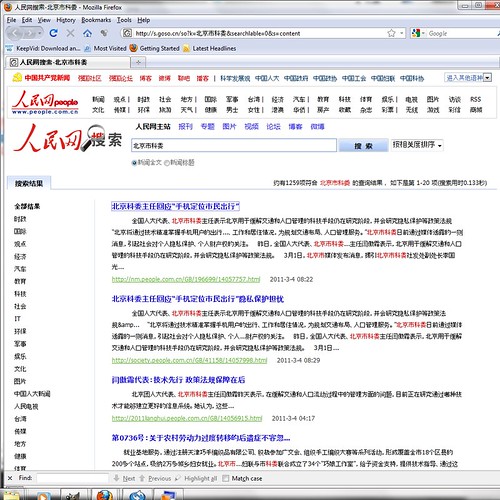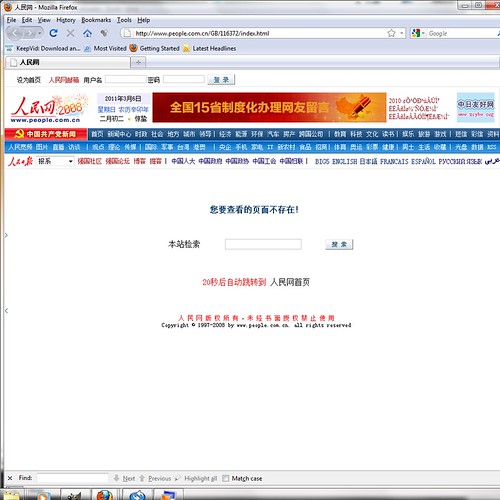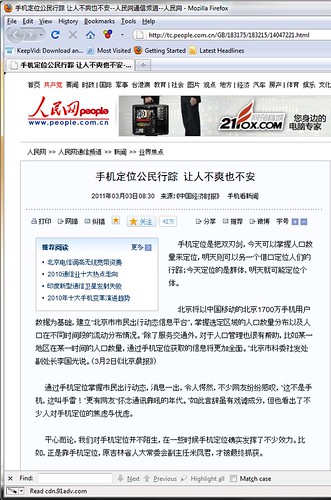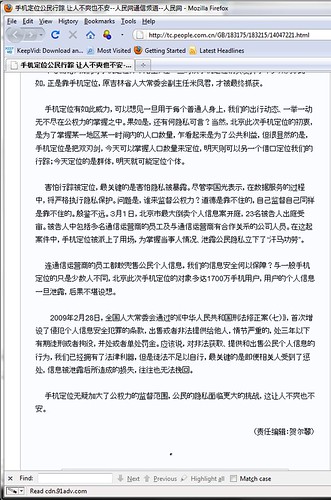一些媒体最近报道说北京市将利用现代科技手段,掌握手机用户的行踪,以利交通布局和人口管理。这一消息刚一传出,立即引起人们对公民通信自由、个人隐私权等问题的担心。
I searched the Chinese Communist Party's official newspaper People's Daily for such report and found results as shown in the image below:
我在中国共产党机关报人民日报搜索了该报告, 发现下面的图片中显示的结果:

However, most of the links to the search results led to only error message pages now, such as the first result Beijing Science and Technology Commission response to "mobile positioning public travel" - which linked to a message: "The Page You Want to See Does Not Exist!":
但是,大部分的搜索结果,链接到错误信息网页,比如第一个检索结果 - 北京科委主任回应"手机定位市民出行":

After a bit more carefully worded search, still on People's Daily, I was able to find some archived stories, such as Mobile Locating Makes Citizens Uneasy and It Is Also Unsafe, which was credited to China Economic Times, which in turn, credited the story to Beijing Morning News. However, I couldn't find such story in Beijing Morning News anymore.
经过一些在人民日报上措辞更谨慎的搜索,我能够找到一些存档的故事,如手机定位公民行踪, 让人不爽也不安,这篇稿是源于中国经济时报,而它又援引了北京晨报。不过,我在北京晨报无法找到这个故事了。
The story gave more details of the proposal tha:
这个故事提供了该建议的细节:
Beijing will based on China Mobile's 17 million mobile phone users data, to establish a "dynamic information platform of people's travel information in Beijing," in order to grasp the population distribution in selected area and the flow distribution at different times. "In addition to service traffic needs, it will be helpful to population management. For example, [we can] obtain more comprehensive information regarding the number of people in one region at a time," said Li Guoguang, Deputy Director of Social Development, Science and Technology Commission, Beijing. (March 2, "Beijing Morning Post")Story continued with people's reactions:
北京将以中国移动的北京1700万手机用户数据为基础,建立“北京市市民出行动态信息平台”,掌握选定区域的人口数量分布以及人口在不同时间段的流动分布情况。“除了服务交通外,对于人口管理也很有帮助,比如某一地区在某一时间的人口数量,通过手机定位获取的信息将更加全面。”北京市科委社发处副处长李国 光说。(3月2日《北京晨报》)
报道继续下去描写人们的反应:
Mobile positioning has such power, one can imagine that when this technology is used on ordinary people, our travel trends, every movement were all in the hands of governmental power. If so, are there any privacy? Of course, the original intention of Beijing's such mobile location is to grasp the number of people in a certain zone within a certain time, at first glance appears to be in the public interest; it is clear that the mobile phone positioning is double-edged sword, people today can use it to grasp the population trends, tomorrow, they can locate the whereabouts of the every one of us; today, the target is a group, tomorrow it may be individuals.
手机定位有如此威力,可以想见一旦用于每个普通人身上,我们的出行动态、一举一动无不尽在公权力的掌握之中。果如是,还有何隐私可言?当然,北京此 次手机 定位的初衷,是为了掌握某一地区某一时间内的人口数量,乍看起来是为了公共利益,但很显然的是,手机定位是把双刃剑,今天可以掌握人口数量来定位,明天则 可以另一个借口定位我们的行踪;今天定位的是群体,明天就可能定位个体。
Although Li Guoguang said that in the process of data services, privacy protection will be strictly enforced. The question is, who is watching the governmental power? Morality is unreliable, to rely on the power to monitor themselves is also unreliable.
尽管李国光表示,在数据服务的过程中,将严格执行隐私保护。问题是,谁来监督公权力?道德是靠不住的,自己监督自己同样是靠不住的。
In contrary to the general mobile positioning on only a few mobile phones, Beijing's new proposal is to target as much as 17 million mobile phone users; once the user's personal information got stolen, the consequences could be disastrous.
与一般手机定位的只是少数人不同,北京此次手机定位的对象多达1700万手机用户,用户的个人信息一旦泄露,后果不堪设想。
The original articles are shown below:
Mobile location will no doubt increase the scope of supervision of public authority, the privacy of citizens face greater challenges, which make people unhappy and this is disturbing.
手机定位无疑加大了公权力的监督范围,公民的隐私面临更大的挑战,这让人不爽也不安。
下图是网上原文:






No comments:
Post a Comment